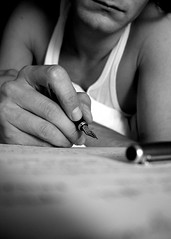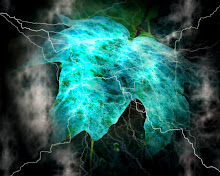"Science continues to leech all the romance out of madness and suggests our fascinating character flaws are just chemical imbalances. Romeo and Juliet are no longer star-crossed lovers, they're codependent. Heathcliff in Wuthering Heights is no longer a brooding melancholic madly in love with the wrong woman, he's a depressive..." --The Power of the Dark Side by Pamela Jaye Smith
Which way would you take this? Would you try to refine the reasoning behind the actions more minutely (scientifically) if your character was a hero or a villain and how would you go about it? What would be the differences in the words that you used? How would they alter if you were describing the hero as opposed to the villain? I'm always fascinated by word use. The word "cold" could be aligned with a season, an emotion, a sensation, an evil presence, etc.
So many times I start out thinking I'm creating a villain and end up deciding he's actually the hero. I had this happen recently in a story with a character I had anticipated to be the villain. But Lel's personality is very complex. Highly intelligent, a fetishist, not quite human, obsessed with someone not quite male nor female nor... Well, it's complicated.
Labeling. I have an intense dislike for the term "labeling" as we use it in society today. Would this story be stronger if I tried to obviously label my hero with a mental disorder? Sexual disorder perhaps in that he has a taste for a certain type of...? Relationship? Does he suffer from some sort of dissociative disorder because of the nature of his upbringing? Or is he intriguingly "remote"? Or is he just a scientist who as a matter of course dissects emotions and people as a natural and expected personality trait? Would using those terms associated with mental disorders add to or take away from the "ambiance" of the story and the romantic mystery of the man? I would guess it depends on the story and on the character.
And then there's dimensionality to characters. That depth of dimensionality can make us empathize with a villain's action, as well as despise the action of a hero. Multidimensional characters are fascinating be they the good or evil.
I'm not saying one shouldn't do their research and understand the foundation of what they write as in discovering the symptoms of a disorder. But taking what we know and crafting it into passionate fictional storytelling with layered, mesmerizing characters--well, that's something else again.
The afternoon light beamed brightly through the window of Kesselbaum’s dominium. His trinex stood before him awaiting his inspection and approval. In looking at Silver, the flash of her newest modifications, Lel could not help but feel some sense of pride in ownership. And yet, there was another emotion wrapped up in his approval of her. Something he dared not name.
Villian or hero? Or perhaps a little of both?



